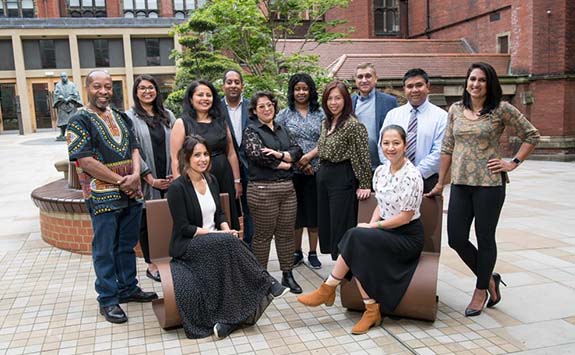Race
Racial equality occurs when institutions give equal opportunity to people of all races.
Race Equality Charter
Newcastle University is a values-based organisation, with EDI at the heart of our strategy. We remain committed to being actively anti-racist and received a Race Equality Charter (REC) Bronze Award by Advance HE. This was in recognition of our work towards tackling race inequality in higher education.
Advance HE’s REC was set up to improve the representation, experience, progression and success of racially minoritised colleagues and students within higher education.
REC follows five principles and provides a rigorous and robust framework. Institutions can then work to critically reflect and act on institutional and cultural barriers. In applying to be part of the REC, we adopt these principles within policies, practices, action plans and culture.
The Race Equality Charter is a vehicle and a foundation on which we can start to work towards being a more equitable institution. We want to give colleagues the opportunity and confidence to challenge systems, processes and practices that perpetuate systemic racism and racial inequality.
REC action plan and implementation
Underlying our REC application is an action plan. It provides a framework to guide our actions around race equality for the period of 2022/23 – 2026/27.
Our key overarching objectives identified in our REC Action Plan are:
- to increase representation from ethnically minoritised groups in colleague and student cohorts, positioning Newcastle University as an employer and academic institution of choice
- to create ‘safe’ and ‘brave’ spaces for belonging, and enhancing colleague and student experiences through effective engagement, communication and partnerships
- to enhance career development opportunities for colleagues, by focusing on the pipeline and the lack of ethnic minority representation in senior positions
- to introduce effective reporting tools and training mechanisms to empower and enable colleagues and students to stand up to and report racial hate crime
- to articulate different perspectives through effective communication and consultation and use these authentic voices and lived experiences as a key driver for change
- to address barriers and sustain change by embedding the principles of race equality in existing structures, processes and committees
Our REC Implementation and Action Group will drive the implementation of our REC Action Plan. It consists of key stakeholders who will lead various aspects of the plan.
Professor Judith Rankin, Dean of EDI, chairs the group, and Naomi Oosman-Watts, Director of Student Success, co-chairs.
 (2) (1).jpg)
